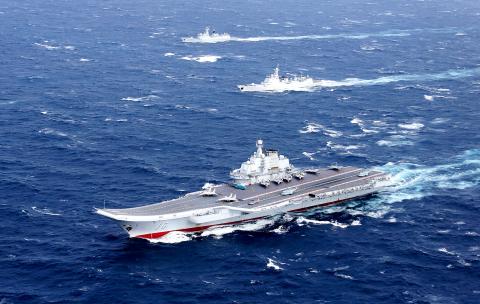The Ministry of National Defense (MND) yesterday said that a flotilla of Chinese military vessels had passed through the Taiwan Strait earlier in the day, heading southward along China’s east coast, after conducting a military exercise near the Japanese island of Miyakojima.
A destroyer, a supply ship and an escort vessel from China’s South China Sea fleet passed through the Miyako Strait — which lies between Miyakojima and Okinawa — into the Taiwan Strait, the ministry said.
The flotilla was traveling west of the median line in the Taiwan Strait and was expected to leave Taiwan’s air defense identification zone by last night, the ministry said, adding that it was closely following the ships’ movement.

Photo: Reuters
The three vessels were returning from an annual naval and air exercise that was conducted on Thursday in an area southeast of Miyakojima, which is about 300km east of Taiwan, the ministry said.
The exercise included drills involving fighter aircraft, early warning and air surveillance aircraft and Xian H-6 bombers, the ministry said.
It said there was no imminent threat to Taiwan, but the nation would continue to keep a close eye on China’s military actions and it is prepared to respond if necessary.
In December last year, China’s first aircraft carrier, the Liaoning, and a flotilla of escort vessels sailed close to Taiwan’s east coast on its way to the South China Sea to conduct training exercises.
On the return leg in January, the flotilla entered Taiwan’s air defense identification zone from the southwest and remained west of the median line of the Taiwan Strait, sailing north to its base in northeastern China.
In response to reporters’ queries, Taiwanese military expert Erich Shih (施孝瑋) said it was difficult to determine whether the aim was to intimidate Taiwan.
China was more likely was trying to gain maritime navigation experience with its military vessels, he said, adding that the targets of the exercises could also have been Japanese or US military bases in the region.

Taiwanese can file complaints with the Tourism Administration to report travel agencies if their activities caused termination of a person’s citizenship, Mainland Affairs Council Minister Chiu Chui-cheng (邱垂正) said yesterday, after a podcaster highlighted a case in which a person’s citizenship was canceled for receiving a single-use Chinese passport to enter Russia. The council is aware of incidents in which people who signed up through Chinese travel agencies for tours of Russia were told they could obtain Russian visas and fast-track border clearance, Chiu told reporters on the sidelines of an event in Taipei. However, the travel agencies actually applied

Japanese footwear brand Onitsuka Tiger today issued a public apology and said it has suspended an employee amid allegations that the staff member discriminated against a Vietnamese customer at its Taipei 101 store. Posting on the social media platform Threads yesterday, a user said that an employee at the store said that “those shoes are very expensive” when her friend, who is a migrant worker from Vietnam, asked for assistance. The employee then ignored her until she asked again, to which she replied: "We don't have a size 37." The post had amassed nearly 26,000 likes and 916 comments as of this

US President Donald Trump said "it’s up to" Chinese President Xi Jinping (習近平) what China does on Taiwan, but that he would be "very unhappy" with a change in the "status quo," the New York Times said in an interview published yesterday. Xi "considers it to be a part of China, and that’s up to him what he’s going to be doing," Trump told the newspaper on Wednesday. "But I’ve expressed to him that I would be very unhappy if he did that, and I don’t think he’ll do that," he added. "I hope he doesn’t do that." Trump made the comments in

Tourism in Kenting fell to a historic low for the second consecutive year last year, impacting hotels and other local businesses that rely on a steady stream of domestic tourists, the latest data showed. A total of 2.139 million tourists visited Kenting last year, down slightly from 2.14 million in 2024, the data showed. The number of tourists who visited the national park on the Hengchun Peninsula peaked in 2015 at 8.37 million people. That number has been below 2.2 million for two years, although there was a spike in October last year due to multiple long weekends. The occupancy rate for hotels